A good column by our SVP for technology & innovation.

A good column by our SVP for technology & innovation.

This was a sobering take on possible downsides of Universal Basic Income. HTT Bryan Caplan.
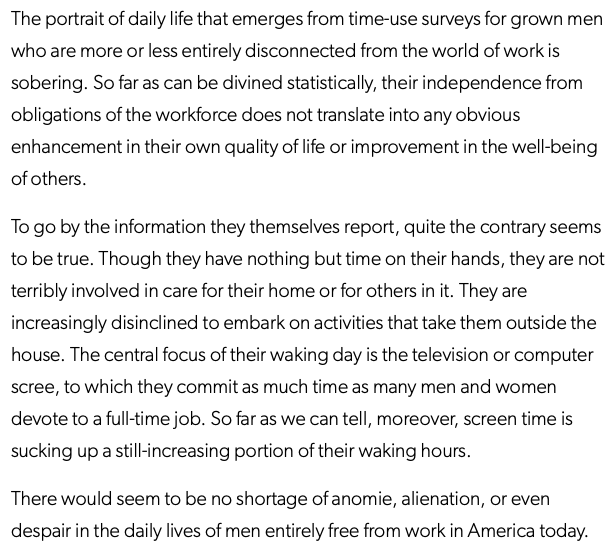
A friend notes that the US has a long of equating vaccines and public health with commie conspiracies. This from 1955, citing US Rep. Clare Hoffman.

What do today’s anti-vaxxers think of the polio vaccine?
~ ~ ~
Among the saner anti-vax objections is the observation that any prior exposure could lead to an overactive immune response in a later exposure – a leading explanation for the 1918 lethality. The careful objectors say simply, “we don’t know it won’t”. True, though I’d be curious whether their odds are notably different from pro-vaxxers. (Do they both agree we’re x% sure it won’t, and just value that differently, or do they have very different x?)
According to my social media, a popular version of the objection is that something is so wrong with the vaccine that half the vaccinated population dies in 5 years, from overreacting to the common cold, or some variant of “gray goo”. This appears to be as informed as the polio-vax scare above.
A stronger version would be that we recreate 1918, but bigger. Suppose SARS-COV-3 appears in 2048, and has a similar relationship that Spanish flu (1918) had to Russian flu (1889): those who got COV-2 (or its vaccine) have a hyperactive immune response. In a world where we don’t vaccinate now, maybe 1/3 of the population gets COV-2, and so suffers heightened mortality in 2048. In the world where we vaccinate everyone, the whole population faces heightened mortality in 2048.
A great deal turns on “heightened”. Like meteor strikes, the main force comes from an exceedingly rare worst-case event. If it’s worth spending on meteor defense, shouldn’t we “spend” to avoid a vaccine own-goal, however unlikely?
It’s worth remembering some things about 1918:
So the bookends choice looks more like:
Do nothing. COV-2 infects about 1/3 of the planet, and ~12M people die. So, about 10M more than now. COV-3 does something similar, but infection mortality is 1-3% among 28-year-olds, so globally we lose up to 1% of them. (Unless we’re prepared for it, and prevent secondary infections.)
Vaccinate. COV-2 stops relatively soon, so maybe 5M total (using Metaculus' forecast for end of 2021.) COV-3 does something similar, but now peak infection mortality among 28-year-olds olds is more like 3-9%, so globally we lose 1-3% of them. (Unless we’re prepared for it.)
Scenario 2 is bleak enough - and you can tweak it to be worse. But in this 1918-specific version, it’s mostly an argument against vaccinating the pregnant and very young. Two groups we already tend to exclude.
But that’s just one scenario. Presumably whatever happens won’t look exactly like 1918. We don’t know what it will look like. But we do know we can probably save 7M lives now by vaccinating. The weight of the “what if” scenarios might be a good argument for limiting vaccination to some degree (just in case), but seem a poor argument against not doing it at all.
Thought exercise: suppose the fastest, cheapest, best way to immunize the population was via GMO corn? I assume it would have no effect on the arguments. But would it shift the battle lines?
[Edit: the thought exercise is not intended as a desirable alternative. It’s here to pump intuition among pro-vax but anti-GMO folks, as the argument outlined above seems similar to anti-GMO arguments. ]
So, we tried this. It’s good, though a bit sweeter than I was wanting today. Fun!
kitchenoverlord.com/dune-week…
⌛️🐛🥖

Bookmarking A methodology for agile data science by Edwin Thoen (ch.5 of Agile Data Science with R). Also favors Kanban. Highlights below.
As a rule of thumb, never work on more tasks simultaneously than the number of data scientists on the team.
One of the major pitfalls of trying to improve a data science product is endless exploration of a hypothesis.
How to manage exploration then?
The data scientist should not take longer for the task than the team agreed upfront, wrapping up even when he does not feel completely finished. If he found an alleyway that is still worthwhile exploring a new task should be put in the backlog, instead of persevering in the current task
Bookmarking Why Kanban for data science. Two core issues:
…tasks have uncertain outcomes
…don’t have a good definition of done
Wait… @agilelisa, this is near your domain, no?
[Edited 2021-02-02 to shorten and include Alexis' suggestion. -crt] [2021-05-23 Updated the CDC “excess death” numbers at the end. tl;dr they went up even more than required. 84,715 for the week of Dec. 26.]
In The Vaccine’s Race Against Time, Andrew Sullivan remembers his experience at the end of the US AIDS epidemic, and reminds us that “plagues … often finish strong.” It’s a good read.
At my church’s weekly service, we used to have general prayers like, “For all those suffering from COVID-19”. But since late autumn it seems we’ve had more specific prayers for parents, siblings, kids struggling with it. Half a dozen in recent weeks. Maybe dropping off now - let’s hope.
Happily the US is vaccinating, if unevenly. Sullivan urges us to continue other measures, because deaths after the cure are all the more tragic. Happily, my VA in-laws have had their first dose. So have many healthcare and at-risk friends nearby. However, my CT elders are still waiting.
Whatever you think of the daily COVID counts, total deaths is pretty solid. And there are over 400K excess deaths (all causes) for 2020. That’s a lot. As expected, the December deaths rose to match April’s, despite some foolish (or malicious) contrarian claims in early November.
| CDC Excess Deaths Count | |
|---|---|
Now (January 31, 2021)
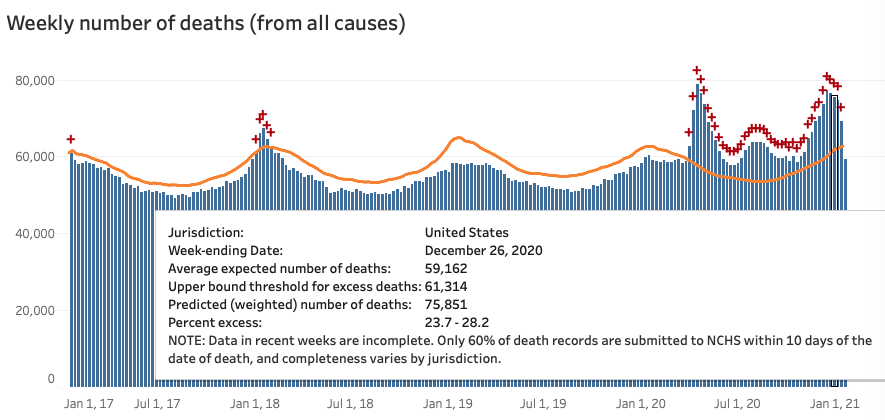
|
Last month - detail
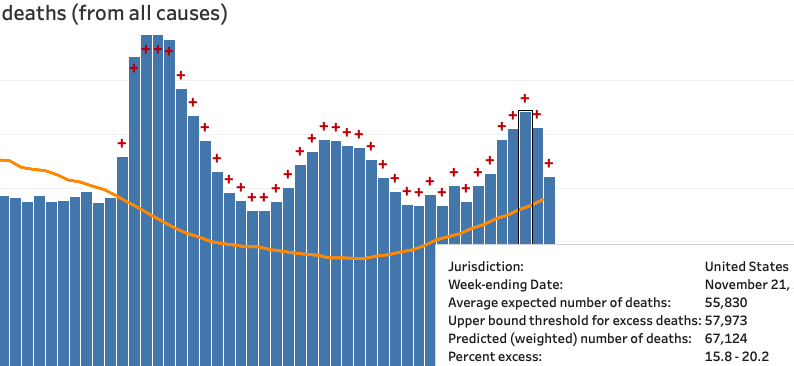
|
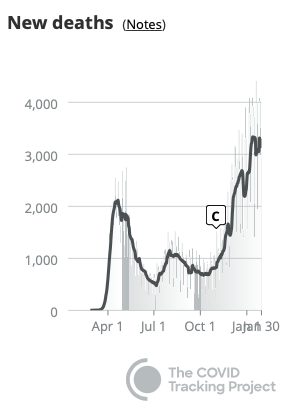 But do the December excess deaths (above) match the **3,000/day average** COVID-19 daily death reports (right)? No. The December daily count is 50% higher than April (3,000 vs 2,000). That's an extra 7,000 deaths per week vs. April - but the CDC *total deaths* peaks are both about the same height. Where are those cases?
[Revisiting 23-May-2021.
* Total for the four April weeks (ending 25 Apr): 302K.
* Total for the four December weeks (ending 26 Dec): 328K.
* That's a difference of 6.5K per week.]
But do the December excess deaths (above) match the **3,000/day average** COVID-19 daily death reports (right)? No. The December daily count is 50% higher than April (3,000 vs 2,000). That's an extra 7,000 deaths per week vs. April - but the CDC *total deaths* peaks are both about the same height. Where are those cases?
[Revisiting 23-May-2021.
* Total for the four April weeks (ending 25 Apr): 302K.
* Total for the four December weeks (ending 26 Dec): 328K.
* That's a difference of 6.5K per week.]
One answer is regular lag. Based on past lag, we expect the top bars to get another 2,000 or so as more certificates flow in. That would still keep them roughly on par with April. So that won’t do.
There could be extraordinary lag – prehaps due to volume, or holiday delays. But it feels ad hoc. In its favor, a 2016 paper found that it took 13 weeks to get to 84% of all-cause deaths, and twice that to get to 95%. Okay, but 4-6 weeks has worked most of 2020. Is there independent reason to think the reporting system has slowed? [Charles goes and checks.] Hm, yes. At least the CDC says so in their weekly report:
Longer delays in reporting of hospitalization and mortality data may occur due to the holidays and the large number of COVID-19 illnesses occurring in recent weeks.
Still… could it be something else?
[The numbers above suggest extraordinary lag is the explanation.]Maybe COVID is displacing other deaths via a combination of: (1) Miscounting, (2) Harvesting, and (3) “On Balance”.
Miscounting: Yes, 3,000 people are dying daily of “PIC” – Pneumonia, Influenza-like illnesses, and COVID-19. But 1,000 of those are actually the usual (non-COVID) P and I, getting miscounted.
Harvesting: Maybe all 3,000 are COVID-19, but 1,000 would have died anyway within say 4 months.
On Balance: Yes, 3,000 die from COVID-19. Also, far fewer are dying of other causes, esp. (non-COVID) P and I.
Miscounting would be the most embarrassing for those involved. Can we test it? In it’s favor, the same weekly report quoted above says the ILI-net is receiving far fewer visits, as people avoid the usual doctor’s office and ER for diagnosis, or only go when they suspect COVID. We can also see essentially no influenza-coded deaths so far this winter (second chart).
ILI-net visits
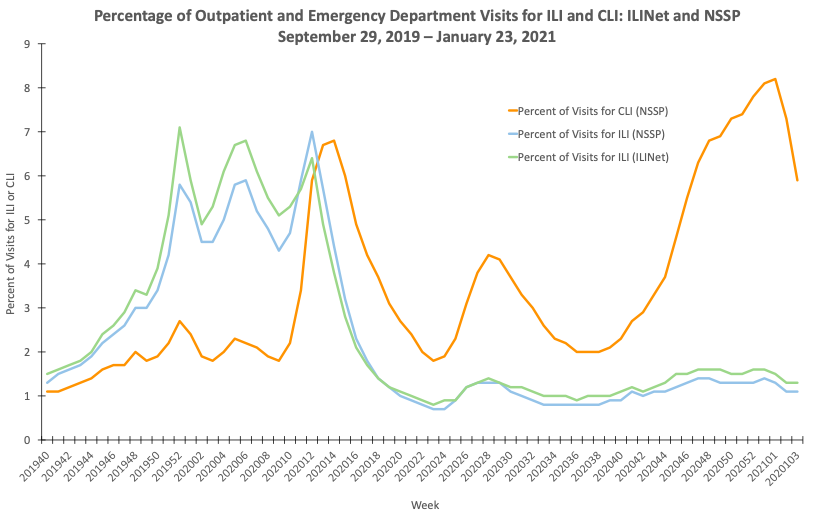
|
Influenza-Coded Deaths (dark blue)
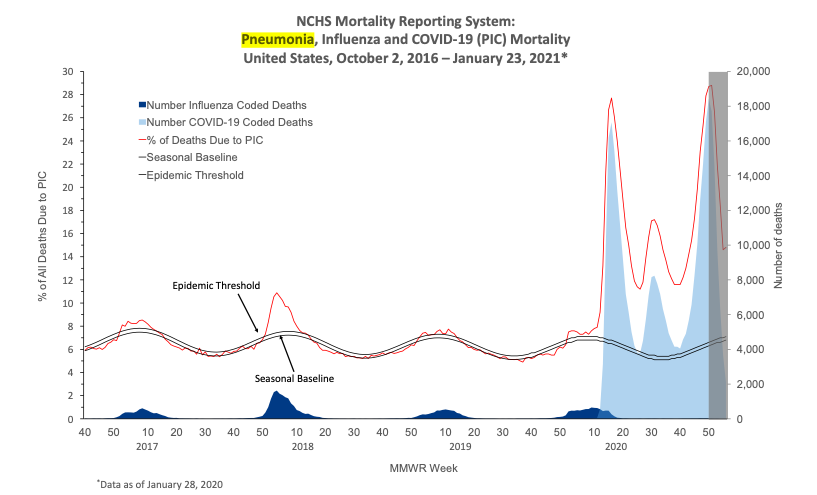
|
Still, maybe the sum of all non-COVID deaths will account for a portion of those 1,000. Testable.
In Harvesting, a younger, faster Reaper beats the old man to the punch. Same people die, just sooner, of a different thing. So fewer excess deaths than COVID-19 deaths. On balance, we get 3,000 daily COVID deaths, but an excess death count of only 2,000.
It need not even be the same people, as long as on balance the numbers match. COVID-19 is much more transmissible, so interventions that keep it around R=1 (as we have) would drastically curtail flu etc. That seems to have happened during Australia’s winter.
I like to think the CovidTracking hospitalization & deaths counts are reliable. But that seems to imply a 50% rise in December’s CDC deaths count, vs. now when it basically equals April’s peak. [I meant 50% rise in excess deaths. But I was wrong. Area under the curve, not peak-to-peak. A 25% rise in excess deaths accounted for the 7,000/week extra.] So, after that exercise, what are my intuitive guesses:
[ Looks now like regular + extra lag just about covers it. ]
If that’s right we’ll see the December total death certificates peaks rise by ~5,000 cases. That still feels high.
In the meantime, I pray we stay well, avoid making others ill, and update our beliefs with new evidence.
Immortal time bias
A subtle trap in treatment studies. I hadn’t heard of it, and had to follow the link before I really got it. To their credit, the authors acknowledge the flaw.
It seems like the current crypto market may be a giant fraud.
This fits my mildly informed blockchain scepticism. I see few legitimate use cases. I’m not alone
I’ve never seen so many people searching so hard for a problem to go with their solution.
Blockchain is a cool technology, but mostly malign. As an article I read a couple of years ago (and can’t find) notes, it’s broken by design: a solution to a post-apocalyptic world where there are no trusted institutions. But the whole of civilization is building trusted institutions.
Found it! Kai Stinchcombe argues blockchain is “Somalia on purpose”. I’d say “dystopian by design”.
On top of that, the most popular algorithms are an environmental disaster, and this has been known for years. CO2 emissions from bitcoin mining offset greenhouse-gas reductions from the Paris treaty. They are at least 100,000x less efficient than normal visa transactions.
Just capturing a facebook post (screenshot) - I went into the internet archive to see what used to be on antifa dot com and when it started redirecting. The q folks of course see the redirect as strong evidence of some nefarious conspiracy. So, thoughts in screenshot.
~ ~ ~ * ~ ~ ~
I notice qnonymous.org is available cheap. If I made that point to whitehouse.gov, …. well probably no one would care. If they did care, the net effect would just increase total agitation, rather than to serve as a reductio. Unhelpful. Besides, if you start from the premise that the world is absurd, then a reductio loses its force.
But perhaps the best reason not to do this is that it does not arise from a principle of charity. On which point, why the original post?

What would happen if the Dems made a strategic compromise on Roe v Wade? If you were Biden, what would you offer, and what require in exchange? If the deal happened as you describe, would that be a gain or loss in next election(s)?
Question inspired by this piece in America, and thinking over a Biden priority tradeoffs essay by Paul Monk.
Wrong About
The winner of the Metaculus Li-Wenliang COVID-19 forecasting tournament was wrong about these. What about you?
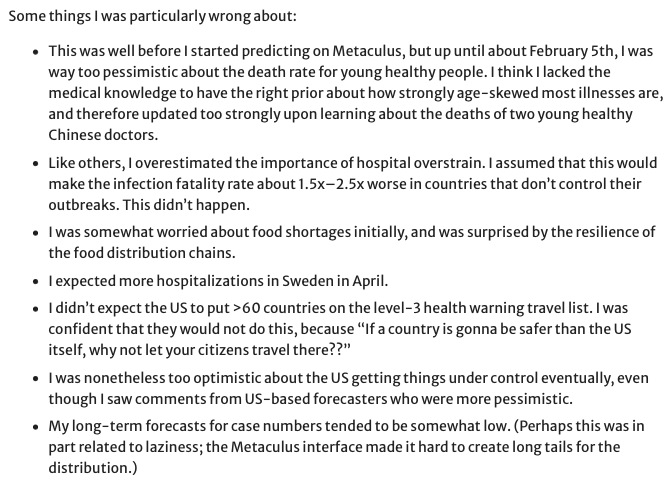
Aristotle argued that an enduring republic required a balance between democracy (popular participation and representation), oligarchy (expertise, serious stakes in the polity and elite gravitas) and monarchy (strong executive authority) if it was to avoid degeneration. It also required a reasonable degree of civic quality and economic equity among its citizens. If the balance was too much disturbed, crises would trigger regression to mob rule, tyranny or oppressive aristocracy. All this is at stake in America right now.
~Paul Monk, “It’s time to address the truth of President Trump”. Probably in The Australian.
From Pale Rider, Afterword:
…and novelists try to put themselves [in] the heads of those who lived through it…. Like worker bees they are busy weaving threads between the millions of discrete tragedies to create a collective memory - a living photograph of the Spanish flu.
I was reviewing this old interview with Australia’s Paul Monk, covering Coronavirus, China, conspiracy theories, reckoning, and risk to Pax Americana, as they looked to him in late April.
If nothing else, listen to him open by quoting Thucydides.
tl;dr Monk reviews key plagues from Athens to now, discusses the situation in April, and assesses three different China-did-it theories, and closes by arguing that the West must reckon with China, and it’s behavior during COV-2 has been a wake-up call.
I’ve had the pleasure to work briefly with Paul on argument mapping and critical thinking, and this is a good example of weighing plausibility and evidence.
It’s probably better to listen or read the interview, but here’s my summary of key points.
I’ve summarized Paul’s summary in a table, filling in numbers from Wikipedia or Ancient.edu (example). It seems the Roman plagues are hard to estimate because they lasted so long.
| Plague | When | Where | # Dead | % Pop |
|---|---|---|---|---|
| Athenian | 4th C BC | Athens | ~100K | ~1/4 - 1/3 |
| Antonine | 2nd C | Roman | ~5M | ~1/3 |
| Justinian | 5th C | Roman & Persian | ~25 - 50M | ~1/4 - 1/3 |
| Black | 14th C | Eurasia+ | ~75 - 200M | ~1/4 - 1/3 |
| Smallpox | 16th C | Americas | ~60M | ~95% |
| Great | 17th C | London | ~100K | ~1/4 |
| Spanish Flu | 20th C | Global | ~50-200M | ~2-3%, but young |
Monk does a nice job separating and assessing the China theories for the origin of SARS-COV-2. As of April, but it seems a solid assessment.
First, there’s the utterly mad theories: 5G and control chips. The China theories aren’t like that. That’s key.
Unrestricted War: deliberate leak. This gains plausibility from the 1997 book Unrestricted War by two Chinese colonels who suggested this possibility. So, it’s a viable theory - and important to note it was sensible for people to draw the connection. So, two avenues of assessment:
a. Sanity Check: Why would the Party agree, given grave risks? (a) How could they guarantee they could control it in China? (b) How could they be confident the outside world wouldn’t figure out whodunnit and “there would be hell to pay”? (c) To control in China you’d have to shut down the economy. Why? When you’re trying to dominate economically? Okay, so it would be hugely risky.
b. Evidence: None. [In the meantime we learned a bit more about how sus' they were acting, but Monk was pretty clear on that already. And their actions are pretty likely on the other China theories too. OK, what about biology? A Taiwanese dissident published a paper saying it was a deliberate release … but her claims for that fell apart. Her publishing circumstances were also dodgy. -And as I try to remind people, evidence is a ratio: to count for this theory, it has to be more likely on this theory than on its contenders. -ed]
c. Meta Evidence: some serious right-wing analysts looked at and dismissed this claim. You’d expect them to jump on it if they could. The intelligence communities in AU, NZ, CA, UK, and US all concluded this looks unlikely. Again, being their key job, you’d expect them to jump on it if they could - at least confidentially. But there’s no evidence in leaks or actions that this is considered remotely plausible.
Unintentional Escape A - It came from Wuhan or another lab, but the usual sort of leak. (Hi, I live in Reston. Ebola anyone?) In this variant, the party simply doesn’t know how it got out, takes awhile to figure it out, and when they do realize “Wow, this is serious”, they say so. If the Party had a history of acting responsibly, this might be more plausible. It doesn’t.
Unintentional Escape: B - As before, but once it leaks they think, “This looks bad” and conduct a propaganda campaign to suppress & whitewash. Evidence: they’re definitely conducting a propaganda campaign, including failed attempts to bully Australia and the rest of the WHO into not investigating.
Yes trading with China helped them prosper. Yes, that was good for us too. Yes, it’s middle class grew, and wanted more liberty. No, the Communist Party did not become more tractable. There was a glimmer of hope, and it was quashed.
Monk says it’s time to get consensus of Western & African countries, and tell China, “This cannot work. It can’t work for us and because it can’t work for us, you’re going to realize it cannot work for you. …there’s no other choice."
1918 and WWI led to the Great Depression, which ushered in reactionary politics around the world: Germany, Japan, Italy, El Salvador. We’re seeing signs now, and that threatens the Pax American that made possible “the greatest expansion in average human wellbeing across the planet … over the last [30-70] years ever in history.” To the extent that other countries follow China to say “Our interests are paramount … then we’re back in the 1930s.”
Paul thinks people have become more reflective, and the pandemic has highlighted the need for global solutions and clear thinking. I suspect it’s just Paul.
He has a nice analogy to The Martian though.
A touching, real conversation on faith, death, grief, culture wars, the Christmas season, comparative immigration, and briefly, Thatcher on climate. Underneath, kinship.
I’m not a fan of the XKCD “free speech” strip. I think it fails the reflexivity test. Lazy screenshot here.
On the other hand, Munroe usually does his homework. Is there a clearer discussion?

Another great piece at Fantastic Anachronism: Are Experts Real.
I hadn’t heard about N=59. 😱
…if the N=59 crew are making such ridiculous errors in their own papers, they obviously don’t have the ability to judge other people’s…
In Slack and Zoom were distracting…, John Lacy notes:
The set new rules:
Sitting at a desk all day, it’s easy to start feeling like a brainless polyp
Walking as as superpower.. HTT the ReadUp community.
Richard Hanania:
A remarkably high percentage of bad economic takes can be attributed to people being unable to realize the world is not zero-sum.
In a discussion with @Somensi about excess deaths, I was puzzled by an apparent discrepancy between two sources that have both been reliable, insofar as I can tell:
The basic question from mid-December was how to reconcile this and this:
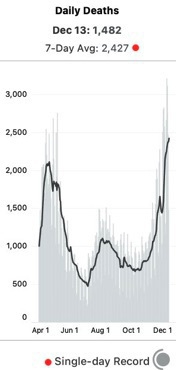 |
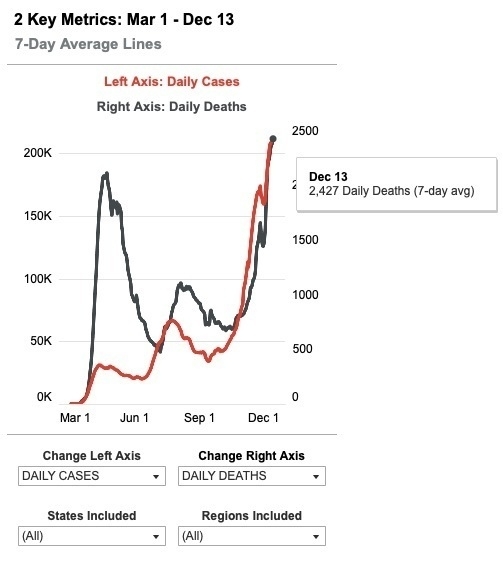 |
With this:
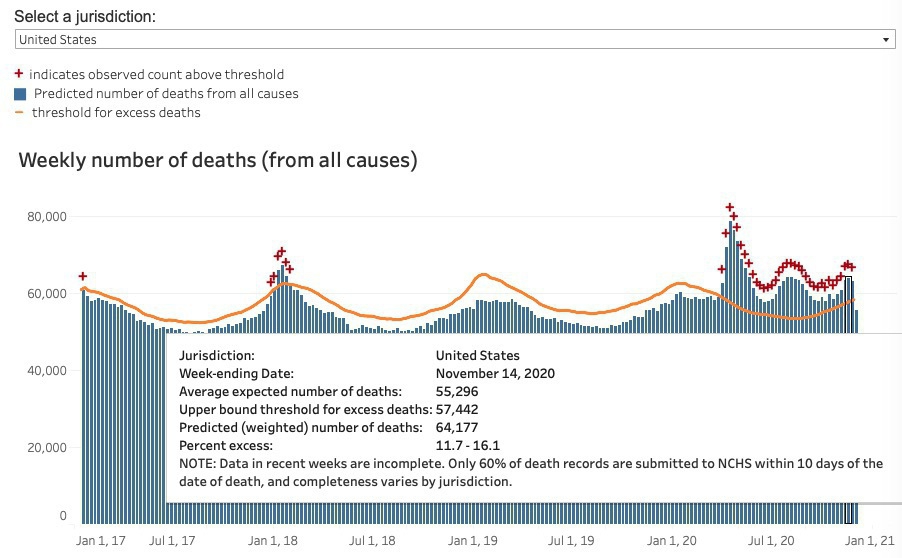
(Screenshots are from mid-Dec.)
In short, by early December it was clear that covidtracking.com had started diverging wildly from the CDC excess death counts. Two basic theories:
There’s a lot of noise on the thread, but @Somensi, who I don’t know, was also looking at data, and citing a good source. Doomsters like me have been using CDC excess data since April as evidence that the pandemic was real and could not be simple relabeling of flu deaths. Here the same source is cited to say the December spike couldn’t be real.
People on both sides who knew the CDC data understood it had a lag of 4 weeks or so – because it relies on actual death certificates completing all their procedural checks and getting filed. In 2016 it took 10 weeks for 80% of certificates to get filed. CDC now claims it gets to 60% in ~10 days. (There are plenty of people who don’t get the lag – it seems even to have tripped up JHU’s Dr. Briand, at least in her headline claim that there were no excess deaths in 2020.)
Problem: covidtracking is the most thoroughly-vetted weekly data source in the US. They’ve tracked the CDC excess deaths (after lag) the rest of the year. And reliably, their cases –predict–> hospitalizations 4 weeks later –predict–> deaths a few weeks later. The December death spike followed that pattern. Plausibly, CDC was just lagging.
Problem: CDC 4 weeks back should be pretty good, and it looked nothing like April. As my correspondent said, CDC data “would have to be lagging by an unprecedented amount."
It’s obvious once you see it.
That death spike (swoop?) at the end is super fast. If you hover over the attributed deaths chart from covid-tracking, you find that the Nov. 14 cases are exactly in line with their July numbers, about half their April numbers. And in line with the mid-Nov. CDC numbers. The steep rise is mostly in the last 4 weeks.
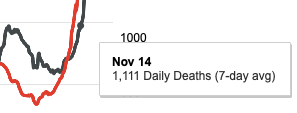
As of Dec. 23, we can look at how the CDC data has changed. Data should be pretty complete through Nov. 21. We see that Nov. 14 is now about 1,000 higher than before (and than the July peak), and Nov. 21 about 2,000 higher than that.

Not a swoop yet, but basically on par with the covidtracking chart week-for-week. Here that is again from today, highlighting Nov. 21. (The bold line is the 7-day moving average, a far better comparison than the daily total.)
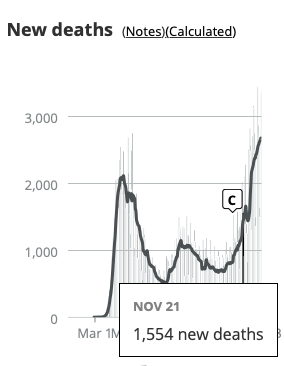
We should definitely expect the CDC excess deaths count for December to reach April levels.
Concentrate
An essay by Grand Master Jonathan Rowan, courtesy of Readup.
But, most of all, I miss the experience of concentration.
“next to of course god america i
love you land of the pilgrims’ and so forth oh
say can you see by the dawn’s early my
country ’tis of centuries come and go
and are no more. what of it we should worry
in every language even deafanddumb
thy sons acclaim your glorious name by gorry
by jingo by gee by gosh by gum
why talk of beauty what could be more beaut-
iful than these heroic happy dead
who rushed like lions to the roaring slaughter
they did not stop to think they died instead
then shall the voice of liberty be mute?”
He spoke. And drank rapidly a glass of water
e.e. cummings – Next to of course god america i | Genius
HTT Tipsy Teetotaler via @ReaderJohn for reminding me of this gem.
Sounds like a fun blog, just shouldn’t be masquerading as a journal.